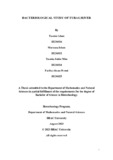Bacteriological study of Turag river
Abstract
The main purpose of this thesis is to identify the bacterium present in the Turag River and get
an overview about its Bacterological identifications. Water is the most fundamental and crucial environmental component controlling the health and well-being of all living things. Bangladesh is a riverine country & it is proud of its over 700
rivers, which have one of the greatest networks in the world. Due to microbial pollution, heavy
metals, and industrial wastes disposed of by industries made the river toxic at a level that has
a very adverse effect on public health .
Among these rivers is the Turag comes from the upper branch of the Buriganga, the principal
river in Bangladesh known as the most polluted river after Buriganga. Tragically, more
industrial effluents are dumped into the Turag River, which contaminates its water with
microorganisms highly. Water collected from 4 sampling sites by maintaining 4ºC was transported to Lab where the
samples spread to different selective and non-selective media. After colony selection, gram
staining, and Biochemical tests were done for identification. Antibiotic susceptibility test was
done to whether the organisms are Resistant, Sensitive, or Intermediate to Multi-drugs. For the
confirmation of the identity of the organisms, the DNA bands were analyzed.
The results of our study accumulate the purpose perfectly and serve as the foundational data
for the bacteriology which emphasizes the presence of fecal origin bacterium named E.
coli(19%), Klebsiella pneumoneae (21%), Pseudomonas aerogenesa (16%), vibrio spp (19%),
and Staphylococcus(24%) they are mostly harmful, disease-causing bacterium.

